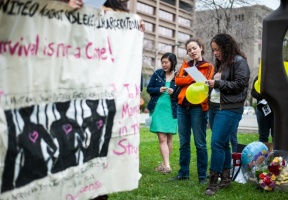

On May 12th, Moms United Against Violence and Incarceration (MUAVI) and co-sponsoring groups, gathered directly across from Cook County Jail with formerly incarcerated moms, and moms who have been separated from kids by other institutions of state violence. Through featured speakers and performances, they drew connections between targeted disinvestment, intensified policing, loss of affordable housing, gender-based violence, and criminalized acts of survival. MUAVI and co-sponsoring organizations collected toiletries for women and gender non-conforming people locked up at the jail and Logan prison, and offered flowers to families leaving the jail after Mother’s Day weekend visits. Participants included moms who have returned recently, including women whose criminalization is related directly to domestic violence. Several have had their cases resolved in the last 10 months due, in part, to a participatory defense campaign involving MUAVI and a number of organizations co-sponsoring the vigil.
In Illinois, approximately 80 percent of people incarcerated in women’s facilities are mothers of minor children. The likelihood of imprisonment for Black women is 1 in 18, compared to 1 in 111 for white women, and Native women are six times more likely to be incarcerated than white women. While incarceration impacts Black and Brown communities in gross disproportion, the fastest growing rate of incarceration of women more recently, is of white women in rural areas. Over 80 percent of incarcerated women are survivors of domestic and sexual abuse, and the majority of women inside had an annual household income of less than $22,500 prior to incarceration. When moms are incarcerated, approximately 11 percent of their kids go into the foster care system, (compared to two percent for incarcerated dads). Eighty-eight percent of incarcerated people were in the foster care system as some point.












